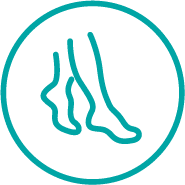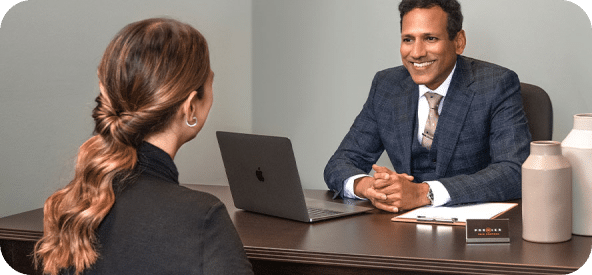Varicose Veins
Does Varicose Vein Ablation Eliminate Varicose Veins?
Defective valves inside the veins cause varicose veins to enlarge and deform, commonly seen in the legs. While some see them as nothing more than an aesthetic problem, they can indicate a much bigger issue, such as venous insufficiency. But no need to worry, varicose vein ablation with radiofrequency is a successful procedure to remove this problem.


Reasons Why Varicose Veins Appear
Varicose veins are enlarged, swollen, and twisting veins, often appearing blue or dark purple. They occur when faulty valves in the veins allow blood to flow in the wrong direction or to the pool. Although this condition can affect any part of your body, it commonly occurs in the legs due to the pressure of body weight, the force of gravity, and the task of carrying blood up to the heart.
Diagnosing and Treating Varicose Veins with Radiofrequency Ablation
The initial step for individuals dealing with varicose veins is to have their condition diagnosed along with identifying its underlying cause. Our vein specialists may recommend radiofrequency vein ablation as a treatment choice.
This method employs radiofrequency energy to address the issue. Damaging the problematic vein’s walls seals it off, and the blood flow redirects toward healthier veins.

Facts about Radiofrequency Vein Ablation

Safe
Radiofrequency ablation has a high level of safety and efficacy, with a success rate of 70-80%.

Recovery
The recovery time after (RFA) is short, and you will be able to walk normally.
Frequently Asked Questions
Even though certain factors like age and genetics cannot be changed, there are still ways to reduce your chances of developing varicose veins or to prevent existing ones from getting worse. You can try several home remedies to help ease the symptoms. However, you should visit a vein specialist as soon as possible to check if there are underlying conditions or potential complications.
In the meantime, you can try the following at home:
- Exercise regularly: Regular physical activity encourages better blood circulation in the legs, which helps push along the blood that’s collected in the veins.
- Watch your weight: Maintaining a healthy weight reduces pressure on your veins.
- Elevate your legs: Whenever possible, elevate your legs when resting or sleeping.
- Avoid long periods of sitting or standing: Try to move around at least every 30 minutes to improve blood flow.
- Wear compression stockings: These stockings apply pressure to your lower legs, helping maintain blood flow and reduce discomfort and swelling.
Not everyone with varicose veins will experience the same symptoms. Some people might not have any discomfort, while others could experience significant pain. Often, the appearance of varicose veins can cause distress due to aesthetic concerns, even when they aren’t causing physical discomfort.
Regardless, if you’re experiencing any symptoms or have visible varicose veins that cause you concern, it’s important to consult with a vein specialist. At Premier Vein Doctors, we help you understand your symptoms, evaluate your condition, and provide you with effective treatment options.
If you notice swelling, a sensation of heaviness, or any changes in your skin color, you should make an appointment with a vein specialist without delay. Remember, even seemingly mild symptoms shouldn’t be overlooked, as varicose veins can sometimes lead to more serious conditions, such as deep vein thrombosis.
While it’s possible not to treat varicose veins, the potential side effects can be dangerous. Issues such as blood clots, infections, ulcers, and bleeding could occur if left untreated. For this reason, speaking with a medical professional specializing in vein treatment is essential.
The heat the therapy generates may cause a slight burning sensation, but it doesn’t last long. It is a normal part of the treatment and will dissipate shortly after.
Results vary depending on the individual. However, research has shown that radiofrequency therapy has an 70-80% success rate.
Though there is a slight chance of adverse effects, such as discomfort, nerve damage, pain, and skin irritation, the risk remains minimal.
After completing the procedure, you may resume your everyday routine and activities. However, avoiding strenuous activities or exercises for a few weeks is essential.
Your vein specialist may also advise that you wear compression stockings for one week following the procedure.
Your vein specialist will make an informed, personalized decision after analyzing your individual needs and assessing your particular situation’s unique details to determine the ideal treatment specifically tailored for you. Alternative treatments they may recommend are:
Non-Surgical Treatments:
- Compression stockings: The first approach to managing varicose veins is often wearing compression stockings. They help veins and leg muscles move blood more efficiently, reducing the symptoms of varicose veins.
- Lifestyle changes: As we mentioned in the prevention section, regular exercise, maintaining a healthy weight, avoiding prolonged periods of sitting or standing, and elevating your legs can all help manage varicose veins.
Surgical Treatments
- Sclerotherapy: In this procedure, a solution is injected directly into the vein, causing the vein to scar and forcing blood to reroute through healthier veins. The collapsed vein is reabsorbed into local tissue and eventually fades.
- Endovenous Techniques: Techniques like radiofrequency ablation and laser therapy are less invasive than surgery. They involve inserting a thin tube into the veins and using heat to shrink and seal the vein walls.
- Vein removal: In some cases, removing the varicose vein altogether is the best course of action. Procedures such as ambulatory phlebectomy or vein stripping and ligation remove the problematic veins to improve symptoms.
Laser treatment is an increasingly popular option for treating varicose veins. This method uses a highly focused beam of light to heat the varicose veins and effectively seal them shut. The veins then become scar tissue and eventually fade away.
While laser treatment is less invasive and typically has a shorter recovery time than surgery, it’s important to be aware of potential side effects, which may include:
- Skin color changes
- A sensation of burning or prickling after recovery due to nerve damage
- Small or large blood clotting in the vein
As with all medical procedures, it’s essential to discuss these potential side effects with your doctor at Premier Vein Doctors, where you’ll receive the most advanced and suitable treatment for your specific condition.

How may we assist you?
Request a Consultation
We are here to assist you in getting the care you need. Please provide us with your contact information, and we will help you schedule an appointment, verify your insurance coverage, or answer any questions. Our top priorities are your health and well-being.
Tell us how we can reach you.
Find Your Nearest Clinic
Locate one of our clinics near you and prioritize your health today. Our top-rated medical centers offer multiple services and convenient locations to provide patients with needed care. Contact us today to schedule an appointment!
Find Your Nearest Clinic
Locate one of our clinics near you and prioritize your health today. Our top-rated medical centers offer multiple services and convenient locations to provide patients with needed care. Contact us today to schedule an appointment!
Find Your Nearest Vein Clinic
With 9 convenient locations, our top-rated clinics are easily accessible to provide you with the best care. Trust us to prioritize your health and well-being, and experience the ease of having a clinic near you.


